Here is a selection of letters and reports from serving Bexhill men which were published in the local newspapers during the First World War. These are their experiences in their own words.
Private C F Whitelock writes to his employer in December 1916;
“We came here last Saturday and brought our lorries with us, and we are here under an hour’s notice to move to –- for embarkation. I am very glad to know that I am going to France instead of Salonika. We are going to be attached to the heavy artillery as ammunition column. I have been having instruction on a lorry that drives on all four wheels and is very hard to drive; they are used for drawing guns. I am getting on fine. I have had two tests. The test was drawing a car with a howitzer a distance of about fifteen miles. I passed both tests. The first was classed as second and the last I passed right out. I was picked out for the lorry as I am an overseer’s man. The person I am billeted with used to live in Egerton Road. It is funny that I should get with someone who knows Bexhill”.
 Sapper G Tutt of Western Road writes to his parents January 1915;
Sapper G Tutt of Western Road writes to his parents January 1915;
“Glad to hear that Jack has arrived in England. I shall look for him if he returns this way. I had a surprise on Sunday [January 11th]. I went for a walk in the afternoon and I met George Berry on guard duty in the village and then I found all the boys – A Dennett’s brother young Vincent [the greengrocer], R Damm, J J Collins – they are all billeted in a large house. They were the last I expected to see. I had a fine time with them. They have been here a week but I did not know they were here. One of them is in hospital wounded. They were surprised to see me. I took them to our train and showed them our sleeping bunks. They landed just before Christmas … Jack Collins is here staying in the same village. Also tell Joe Davis that George Berry is enjoying himself. Also tell T Routledge they have left Philp at the base at —. They are all enjoying themselves. I shall go and see them every night while we are here. We are having a long stay here and it would be very nice if we could get some fine weather. It is a beautiful country all round. We are getting plenty of eggs, 2½d each, and milk 1¾d a pint. Condensed milk is very dear, they charge 1¼ francs for a tin [1s 3d]. The worst job is shopping, as it is so hard to understand the people. We are close to the Belgian frontier.”
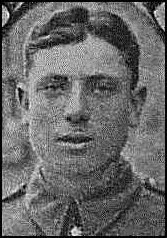 Lance Corporal F Smith 2nd Battalion Royal Sussex Regiment speaks to a newspaper reporter at his home at 23 Sackville Road, March 1915;
Lance Corporal F Smith 2nd Battalion Royal Sussex Regiment speaks to a newspaper reporter at his home at 23 Sackville Road, March 1915;
“I was in the thick of it when a German soldier got me in a corner and it looked as if I was going to be polished off. He thrust at me with his bayonet and I saw my first finger on my left hand go off. Then a sergeant rushed up and bayonetted the German in the neck. It was not until some minutes after that I felt the pain of my finger, and had to drop out. I was sent to the field hospital in the firing line, but we all had to clear out soon after as the Germans started shelling it.”
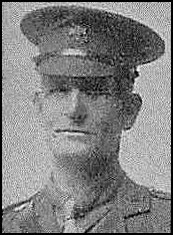 Captain A J Sansom 5th Battalion Royal Sussex Regiment in October 1915 writes;
Captain A J Sansom 5th Battalion Royal Sussex Regiment in October 1915 writes;
“I walked over to the transport section yesterday afternoon. These men have a very hard life, and I always look them up whenever I get the opportunity. I am rather glad that we have succeeded in getting several matters with them improved. Men and horses never get a day’s rest, and now they are relieved once in every 7 or 10 days. We have set up our own farrier’s forge and make our own shoes. We also repair our own harness and saddlery, and the horses are hot-shod instead of cold-shod. All this of course ranks as skilled work, and we have applied for the men to be certificated. They passed the exam last week, and have now been granted 6d a day extra pay. The NCOs and men of the Battalion are something extraordinary, and I should like to know if similar conditions exist in other units, but of course one cannot ask questions of the kind, and the information is not volunteered. You will hardly believe that only on two occasions during the last nine weeks have any cases been brought up before the CO at the Battalion Orderly room and both of those were dismissed! The men are well fed and warmly clothed, and with the exception of not having a change of clothing and boots, they are simply supplied, but of course it also means they are wet-footed for days together. There is hardly a man in the Battalion who is not ready to talk to you with a cheery smile, although he has slept in a bitterly cold and draughty barn, had no household comfort of the ordinary kind for washing, dressing or meals, is wet through and likely to remain so, and knows that the working party he is to go on for that day or night may be shelled out of existence. Can you wonder that I look upon being out here with these men more as a privilege than an onerous duty?”
Bandsman N Robarts 5th Battalion Royal Sussex Regiment writes to his parents at Gillbury Cottages, Cooden Drive, May 1915;
“Yesterday there was a bit of an air duel over our billets. A couple of Germans got over our lines, and as our guns could not hit them two of our aeroplanes went in pursuit. Our planes are over the German lines getting the range of the artillery every day. It’s rather interesting to see how close the shells get to them without doing damage. The village we are in front of now has a church all blown to pieces. You can see the bodies all blown out of the graves. We see some sights. I would not have missed this for anything … We are back in reserve now and well we need a little rest after a week ago. I suppose you have heard we were in an attack, and I never want to be in another. We were going from one early morning till the following without a break, so you can guess there was ‘some excitement’. I had all my kit blown up, just after I left it in a dug-out. When are the ‘Lambs’ coming out? We are always expecting the New Army … I have no chance to pick up any souvenirs, save one, and that’s myself. Still I’m perfectly satisfied.”
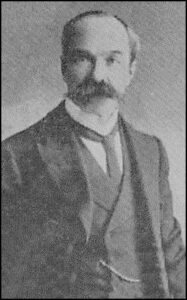 Gunner H L Neale writes to the Bexhill Observer July 1915;
Gunner H L Neale writes to the Bexhill Observer July 1915;
“23 NCOs and men have been detached from the Battery at Ferozepore and sent here. Dalhousie is a station in the Himalayas and I can assure you that it is a great relief to be here away from the fierce heat of the plains, if only for a few weeks, for it was almost unbearable. When I left 120 degrees in the shade was about the usual at noon. The neighbourhood of Dalhousie comprises a series of hills or spurs, and is extremely beautifully situated, 9,600 feet above sea level, and covered with forest scenery. It affords an endless variety and charm to any one who cares to make a study of Nature. By road it is 52 miles from the nearest railway station, and the march here was through some very wild mountain scenery although the journey was a rather trying one, for you know we are not much used to foot marches, and it was a bit stiff, the climb up. Facing me, as I am writing, are the peaks of the higher mountains, varying from 15,000 to 17,000 feet in height and covered with snow, so you can picture yourself the grandeur of the scene.”
Private F R Meades Royal Fusiliers writes to a work colleague, February 1918;
“Thanks for your parcel. I was jolly glad when it came. We have come out of the front line and were ‘in support’ when it arrived. It was fairly quiet in the line, but bitterly cold. We had a lot of snow and a thaw. Then it froze, and one could hardly stand. I was glad to do a patrol at night to see that Fritz kept his side of the Piave River. There was not too much fear of him crossing over, it was too cold. Of course we had his ‘iron rations’ and he had some of ours, but he didn’t do too much damage to us. Since coming out of the line we have had a good time. We came on a three days march back, passing through a very ancient and historic city on our way, and arrived at our billet about 9 pm. Have been nearly two weeks here: it is a lovely spot in a sort of valley with mountains all around us. We get plenty of work while not ‘on rest’. That ‘rest’ is a very ambiguous term, as we are on drill and training all day, but we are out of the other business, and we have got a billet in a chateau, so we do not mind the work. Naturally we grouse and grumble, but you will always find that amongst soldiers. We have our own canteen here, and we can also purchase from the Italian shops such things as oranges, nuts, chocolates etc. Oranges are cheap as we get six for a Lira, which in English money value would be about 6d. You will be interested to know that while on our march here I saw an R E coming along the road with a coil of wire and you can imagine his surprise when I called out “What cheer, Saunders!”. That was who it was and he looked fit and well, twice the man he used to be.”
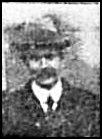 Gunner H A Long Royal Garrison Artillery writes in September 1917;
Gunner H A Long Royal Garrison Artillery writes in September 1917;
“We had a very rough crossing, many of us were very ill, and was a relief when the boat drew into the harbour. We marched to a rest camp for a few days, and then on Sunday we were in the train at 7:15 am. We were put in goods trucks, and commenced our journey. We passed through tracts of agricultural land, the corn having been laid low through the recent heavy rains. We reached — at mid-day, where we had 15 minutes stop. The men tumbled out to stretch their legs and get refreshments from a welcome canteen and YMCA. We soon were off again, and reached our destination at 7:45. When unloading Fritz took the opportunity of dropping a whistling shell over us. By this we realised we were near the enemy’s lines. We proceeded from here by transports for nearly a ten mile journey, getting to camp about 9 pm. Tea was quickly provided, and we turned in, but not to sleep, for the guns commenced all around, and Fritz was overhead. Several bombs were dropped near us, but no damage done. Nevertheless, it made us realise that we were in the danger zone. Next day we were marched to our Battery and found them busy, sending the Boches a big dose of shells. We were all told off on various jobs. The country around is one of desolation, huge shell holes, old German trenches, and stumps of the trees left standing only. The latter appeal to one more than the shell holes, as they stand up all around an awful picture of what the shells have done. It is a reality one has to see to realise the awful damage of the war. Also houses, churches and schools all wrecked or like the Bairnsfather’s picture of the officer who was commencing his letter to his wife with the words. ‘We are at present staying on a farm’ the picture showing a part wall only. One great feature here is the cheeriness of the men. They hardly trouble about the enemy, and go about their work as if no danger was near. Should shells fall they say that ‘old Fritz has woke up, then’. The saddest sites are the cemeteries, where men of many regiments are buried. Oh, how it makes me feel to think so many of our bravest and best lie out here under a small wooden cross. In some cases the words are ‘an unknown Brave British Soldier.”
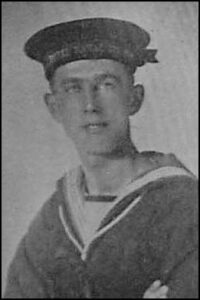 Able Seaman Walter Gwynne of the Royal Naval Division speaks to a newspaper reporter at his home at 83 Windsor Road, October 1915;
Able Seaman Walter Gwynne of the Royal Naval Division speaks to a newspaper reporter at his home at 83 Windsor Road, October 1915;
“Friday, April 16th. We left Lemnos at 6 am this morning. At 9 am we had to parade as we heard the Austrian fleet was out. We saw their boats on the horizon. But there was a nearer danger than this. A Turkish destroyer was out, and, coming up with the transport ‘Minnetow’ gave a thousand men five minutes to leave. The dirty dogs! As the boat was loaded with ammunition, the order was given ‘every man for himself’. Of course there was a rush and the boats were swamped. The destroyer fired three torpedoes at a range of 50 yards and all missed. But half the crew were in the water and on rafts and planks and anything they could lay their hands on. On our approach the destroyer sheared off, as she thought we were armed. Then began a terrific rescue work. I never want to see anything like it again. The poor fellows were going under all ways, but by prompt action we saved nearly 100. Six died and we buried them at sea in the afternoon. The fellows we rescued were blue with cold and many were injured. We transhipped them later in the day. The Turkish destroyer was driven ashore and finally sunk by one of ours after a short trace. If we had been one hour earlier it would have been us and not the ‘Minnetow. Thank God we weren’t.”
Private H T Gardiner writes from a front line dug-out 29th July 1916;
“The nights are, of course, the trying time, for being shelled or pelted with torpedoes is not so bad as the eye-straining peering into the blackness watching for signs of activity on the part of the enemy. Little raiding parties are very common; two or three men go over to the other lines, shoot a few men in the trench, throw bombs into the dug-outs to blow up the hapless slumberers, bag a prisoner or two and bolt back home – if they can! Both sides do this often with fair success. On a dark night it is largely a question of hearing and one gets so suspicious of the least noise; I’ve been in a horrid state of “qui vive” for minutes on end owing to weird noises a few yards away from the parapet on which I sit, only in the end to be scared by a huge rat or two scampering past! Of course the varied noises torpedoes, oil cans, machine guns and whizz-bangs make, and the feverish calculations deduced therefrom as to where the missile is coming [with a frenzied leap for the narrow funk hole in the parapet if the thing drops near you], all add to their little thrills … Two visits from the German trenches came to our Battalion last night; in one case the two men were chased and escaped; in the other one was shot and the other two who came up crying “Kamarad, don’t shoot!” were taken prisoner to their great relief and our delight, this being our first capture.”
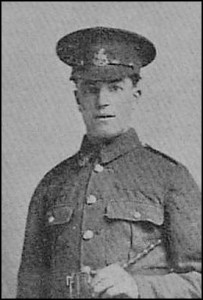 Private F R Freeman of the 2nd Battalion East Kent Regiment speaks to a newspaper reporter at his home at 52 Cornwall Road, July 1915;
Private F R Freeman of the 2nd Battalion East Kent Regiment speaks to a newspaper reporter at his home at 52 Cornwall Road, July 1915;
“I enlisted in the 2nd Buffs last September and was sent out to the front in January. I was in the fighting at Zonnebeke, St Julienne – where we were sent to recapture French trenches taken by the enemy by means of poison gas – St Eloi, Hill 60 and Ypres, where I got my wound on May 2nd. We were forty in all in a trench, and after a very heavy bombardment with shrapnel shell and bombs, the Prussian Guards charged. All those who were with me were down – I think killed – and then my machine gun was blown up. I tried then to get to cover in a wood, but they got me. One bullet passed through my forearm and another lodged in my shoulder. It is there yet; the surgeons are waiting until it moves to cut it out. It was about two o’clock when I got my wounds, and I took refuge in a trench until it was dark and I could get them dressed … I had one taste of the poison gas. It is awful. It blinds you for a time, and makes you feel as if your throat, lungs and stomach were on fire.”
Private V Coppard of the 2nd Battalion Royal Sussex Regiment writes to his father at Beaconsfield Road;
“The first shells have a remarkable effect. You have been marching under tension, expecting you hardly know what, when suddenly the whine of shrapnel breaks in on you, with the rash of its explosion on the still air, and then another and another. Whether you realise what they are or not, whether they are near you or not, you duck, dodge, and feel that you want to run anywhere. That this is war becomes a fact all vivid and threatening; the tension is snapped. There is the unexpectedness, the newness, the noise, and the uncertainty of what will follow in that one instant. Rifle fire affects you differently. You feel a queer emptiness where your stomach ought to be. You know that they mean you, and you want to disappear, but you don’t know how. Then you get hold of yourself and stiffen up, and go ahead. The officer’s example counts for much. He seems to find himself very quickly. The fact of his fearless ness gives you confidence. Then the advance – it’s the first disillusionment, and a pretty one. None of that music, colour flying, quick time work you read about. Indeed, a terrible strain, with perhaps your chum shot by your side, whom you may not stop to help. You have a current of thought which you try to force from you. You have an ever growing impulse to stop and shoot, you persuade yourself you could do much more good by staying in half cover and shooting, and it comforts you to hear your rifle go off. But your line is advancing, and you must advance too.”
Private H Chessell Army Veterinary Corps writes, March 1917;
“I am one of the dressers at the 18th Veterinary hospital somewhere in the Balkans. Some reinforcements came out last week from Woolwich and I had the pleasure of seeing Mr Harmer, Mr Gladwish and Mr Cramp, all of Bexhill. It was quite cheery to hear all the latest news from Blighty. We don’t hear one half that’s going on. We get the “Balkan News” every morning, but it’s eaten up with Greek and Macedonian adverts. I am working in a very large hospital. We have considerably over 3,000 mules and horses, all sick, either wounded or debility. The mules do well in this country as they are more suitable for the mountains. We have some fine specimens here. They are stabled in lines from 100 to 150; our hospital turns out some of the finest mules in the country. They come in from the line on one leg and go out fit and well on four.”
Leading Stoker R Burridge “HMS Hogue” speaks to a newspaper reporter at his home at 4 Coastguard Cottages October 1914;
“I was in the engine room at the time the torpedo struck the “Hogue” and heard the crash and saw the torpedo coming. When I heard the crash I rushed to the top of the ladder, and directly I got on deck I heard the order given “Every man for himself”. The vessel was heeling over fast and the starboard side was full of water. I ran to the forecastle to see if I could get anything to help me save my life, a piece of wood or anything of the sort. I came to the starboard battery again and tried to get hold of a barrel and get out of the starboard gun port, when a wave came in and washed me away. I ran aft and went overboard the stern of the ship, which was well in the water. I plunged into the sea and was seized by a man that was nearly drowned. I had to struggle with him to save my life, and at last he went under. I managed to get over the struggle and to secure a piece of wood. I drifted about an hour hanging on to the piece of wood until I found myself within ten yards of one of our boats. I left the piece of wood and swam to the boat, and was helped in by one of the crew. She was one of the “Hogue’s” boats, and I was put on board the steam packet belonging to the “Hogue” which was leaking badly. We were taken on board the steamer “Flora” and taken into Holland, and then to the Red Cross hospital, where attention was paid to us and great care taken of the wounded. We were given dry clothes and food and well looked after that night. In the morning we left by train – we were dressed in Dutch naval uniforms – for another town, and thence to the international camp for prisoners of war. We were first treated as such, but afterwards released as shipwrecked mariners, returning to England. On Sunday afternoon we caught the Flushing boat, and were landed at Sheerness, whence we went to the Admiralty at Chatham, where we were granted ten days leave.”

